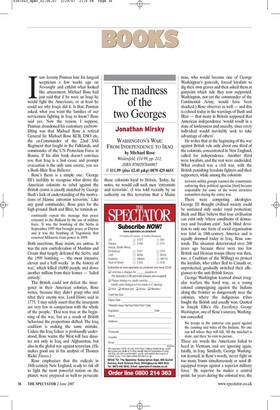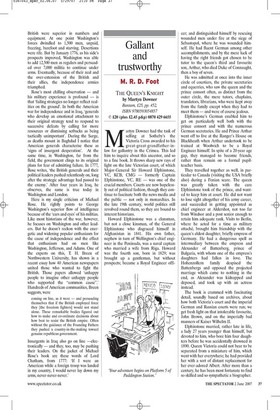The madness of the two Georges
Jonathan Mirsky WASHINGTON'S WAR: FROM INDEPENDENCE TO IRAQ by Michael Rose Weidenfeld, £14.99, pp. 212, ISBN 9780297846987 £11.99 (plus £2.45 p&p) 0870 429 6655 Isaw Jeremy Paxman lose his languid scepticism a few weeks ago on Newsnight and exhibit what looked like amazement. Michael Rose had just said that if he were an Iraqi he would fight the Americans, or at least he could see why Iraqis did it. Is that, Paxman asked, what you want the families of our servicemen fighting in Iraq to know? Rose said yes. Now the reason, I suppose, Paxman abandoned his customary eyebrowlifting was that Michael Rose is retired General Sir Michael Rose KCB, DSO etc, the ex-Commander of the 22nd SAS Regiment that fought in the Falklands, and commander of the UN Protection Force in Bosnia. If his slim book doesn't convince you that Iraq is a lost cause and prompt evacuation is the only sane course, you are a Bush-Blair True Believer.
Rose's thesis is a simple one: 'George III's inability to recognise what drove the American colonists to rebel against the British crown is exactly matched by George Bush's lack of understanding of the motivations of Islamic extremist terrorists.' Like any good commander, Rose goes for the high ground. Bush and Blair, he reminds us continually repeat the message that peace returned to the Balkans by the use of military force. It was the bombing of the Serbs in September 1995 that brought peace at Dayton and it was the bombing of Yugoslavia that removed Milosevic from power in 1999.
Both assertions, Rose insists, are untrue. It was the new confederation of Muslims and Croats that largely defeated the Serbs, and the 1999 bombing — `the most intensive eleven and a half weeks in the history of war,' which killed 10,000 people and drove another million from their homes — 'failed entirely'.
The British could not defeat the insurgency in their American colonies, Rose writes, because they didn't grasp who and what their enemy was. Lord Howe said in 1775, 'I may safely assert that the insurgents are very few in comparison with the whole of the people.' That was true at the beginning of the war, but as a result of British behaviour the proportions shifted. The Iraq coalition is making the same mistake. Unless the Iraq failure is profoundly understood, Rose warns, the West will face disaster not only in Iraq and Afghanistan, but also in the global war against terrorism. (He makes good use in his analysis of Thomas Ricks' Fiasco.) Rose emphasises that the radicals in 18th-century New England, ready to risk all to fight the most powerful nation on the planet, were prepared as well to persecute those colonists loyal to Britain. Today, he notes, we would call such men 'extremists and terrorists'. (I was told recently by an authority on this terrorism that a Maine man, who would become one of George Washington's generals, forced loyalists to dig their own graves and then asked them at gunpoint which side they now supported. Washington, not yet the commander of the Continental Army, would have been shocked.) Rose observes as well — and this is echoed today in the warnings of Bush and Blair — that many in Britain supposed that American independence 'would result in a state of lawlessness and anarchy, since every individual would inevitably seek to take advantage of others'.
He writes that at the beginning of the war against British rule only about one third of the colonists, concentrated in New England, called for independence. Another third were loyalists, and the rest were undecided. What evolved was a civil war, with the British punishing freedom fighters and their supporters, while among the colonists terrorist militia groups roamed the countryside enforcing their political agendas [that] became responsible for some of the worst atrocities committed during the entire war.
There were competing ideologies: George III thought civilised society could be sustained only under royal protection; Bush and Blair believe that true civilisation can exist only 'where conditions of democracy and freedom exist'. Such blind devotion to only one form of social organisation was fatal in 18th-century America and is equally doomed today in Iraq, Rose contends. The situation deteriorated over 200 years ago because there were too few British and Hessian troops (there was then, too, a Coalition of the Willing) to protect the loyalists, who either fled to Canada or, unprotected, gradually switched their allegiances to the anti-British forces.
George Washington learned about irregular warfare the hard way, as a young colonel campaigning against the Indians along the frontier so dangerously near the colonies, where the indigenous tribes fought the British and usually won. Quoted in Joseph Ellis's His Excellency George Washington, one of Rose's sources, Washington conceded: No troops in the universe can guard against the cunning and wiles of the Indians. No one can tell where they will fall, 'till the mischief is done, and then 'tis vain to pursue.
These are words the Americans failed to heed in Vietnam, and are ignoring again, fatally, in Iraq. Similarly, George Washington learned, in Rose's words, 'never fight on too many fronts simultaneously or send illequipped troops against a superior military force.' By superior he makes a central point: for years during the colonial war, the British were superior in numbers and equipment. At one point Washington's forces dwindled to 1,500 men, unpaid, freezing, barefoot and starving. Desertions were rife. But by January 1776, as his side's prospects improved, Washington was able to add 12,500 men as regulars and persuaded over 7,000 militia to continue under arms. Eventually, because of their zeal and the over-extension of the British and their allies, the independence armies triumphed.
Rose's most chilling observation — and his military experience is profound — is that 'failing strategies no longer reflect realities on the ground'. In both the American war for independence and in Iraq, 'generals who develop an emotional attachment to their original strategy tend to respond to successive defeats by calling for more resources or dismissing setbacks as being tactically unimportant'. During the Surge, as deaths mount in Baghdad I notice that American generals characterise these as 'signs of insurgent desperation'. At the same time, in Washington, far from the field, the government clings to its original plans for fear of admitting failure. In 1777, Rose writes, `the British generals and their political leaders pushed relentlessly on, long after the strategic advantage had passed to the enemy.' After four years in Iraq, he observes, the same is true today in Washington and London.
Here is my single criticism of Michael Rose. He rightly points to George Washington's superior flow of intelligence because of the 'ears and eyes' of his militias. Like most historians of the war, however, he focuses on Washington and other leaders. But he doesn't reckon with the energetic and widening popular enthusiasm for the cause of independence and the effect that enthusiasm had on men like Washington, Jefferson, and Adams. One of the experts on this, T. H. Breen of Northwestern University, has shown in a recent essay how 40 American newspapers united those who wanted to fight the British. Those papers allowed 'unhappy people to imagine other unhappy people who supported the "common cause": Hundreds of American communities, Breen suggests, were coming on line, as it were — and persuading themselves that if the British employed force they [the freedom fighters] would not stand alone. These remarkable bodies figured out how to make and co-ordinate decisions about how best to resist the British empire. Often without the guidance of the Founding Fathers they pushed a country-in-the-making toward genuine republican government.
Insurgents in Iraq also go on line —electronically — and they, too, may be pushing their leaders. On the jacket of Michael Rose's book are these words of Lord Chatham, from 1777: 'If I were an American while a foreign troop was landed in my country, I would never lay down my arms, never-never-never.'





















































 Previous page
Previous page